Three esteemed female investigative journalists talk about the challenges they face while engaging in male-dominated fields and offer valuable advice to aspiring young reporters.
Good news, bad news, and the solution
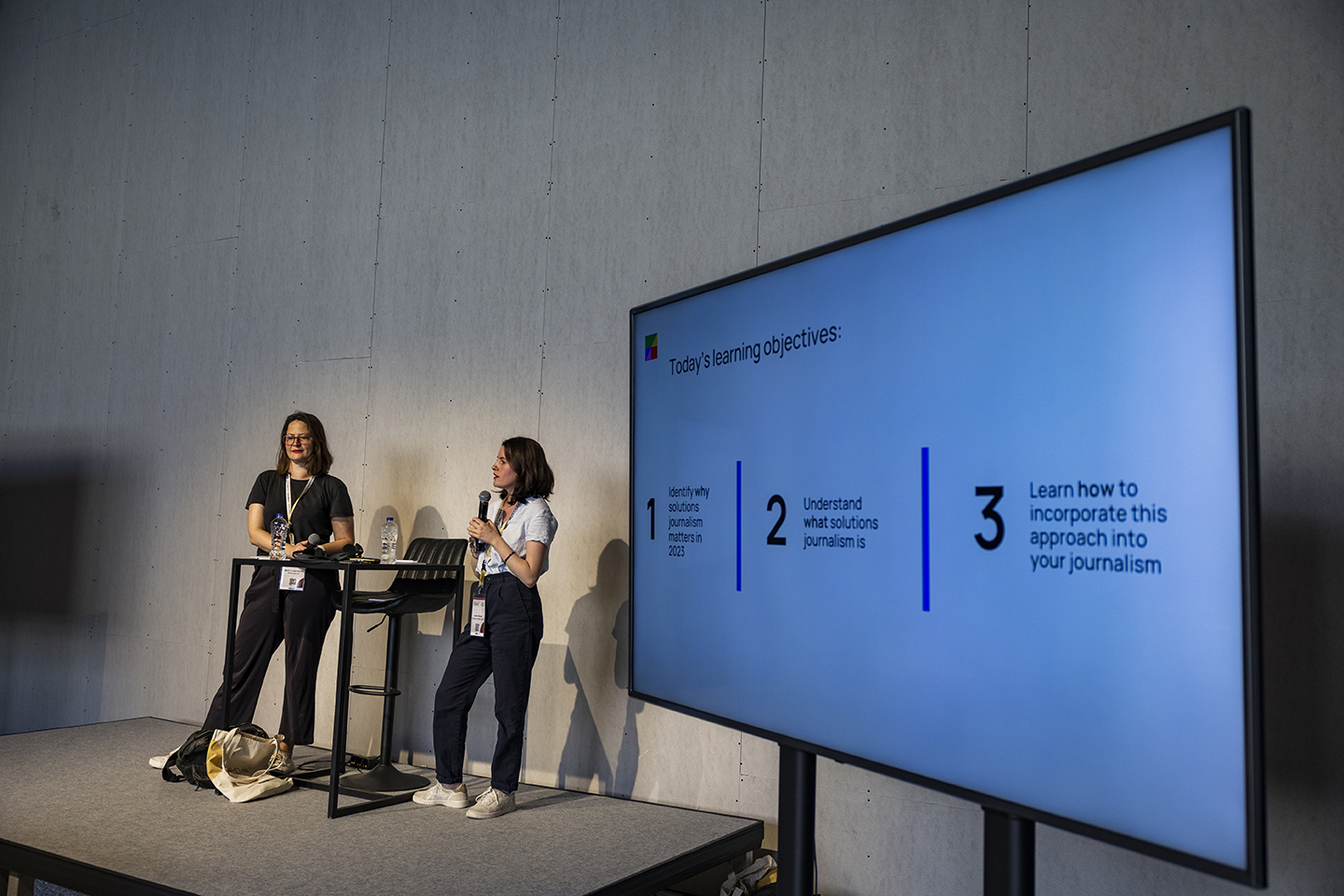
How can journalists avoid the good news trap, be part of the solution in a problem-focused industry, and distinguish their content from traditional media outlets? Juliette Gerbais talks with iMEdD about Solutions Journalism and the quest for answers to present challenges.
With 58.0 points out of 100, Greece ranks 24th out of the 27 countries in the EU on the Gender Equality Index. Its score is 12.2 points below the score for the EU as a whole. What does this mean for journalists either reporting on gender issues or conducting investigations? How can the gender gap in journalism and in leadership positions be bridged so as more people’s voices are included in the narrative? Three female journalists explain at the iMEdD International Journalism Forum 2023.
Including diverse voices
According to Catherine Gicheru, ICFJ Fellow/Director at the Africa Women Journalism Project, in the panel discussion “Inclusive narratives: Making gender part of every story”, integrating gender in every story is not only a matter of inclusivity and equality, but also a business imperative. Since women and femininities represent approximately 50% of the population, media organizations’ survival depends on them. This might seem a superficial incentive for journalists who are deeply concerned with gender issues, however this might be the only means through which editors could be persuaded that their newsroom should start taking into consideration diverse perspectives as well.
In an interview with iMEdD, Catherine Gicheru highlighted that diversity does not only refer to gender, race or class, but also to the way of thinking, the mentality of people. This means that even seemingly “privileged” individuals who do not face any serious discrimination due to biological or social factors, can contribute to the diversity and inclusion of their newsroom. Gicheru supports that it is our right to defend people different from us, even if we don’t belong to that group, since in this way, we acknowledge that “our differences shouldn’t divide us, but unite us because we are uniquely made”.
As a result, diversity can be found even in the way the storytelling is framed. Some questions journalists can ask in this direction are the following: “Does my article reflect the diversity and the expertise that is there?” and “How would the people I report on like that story to be told of me?”. These questions can help journalists realize how they should represent individuals in a way that confers agency rather than victimization. Applying a lens in every story they approach can make a difference not only for the people who identify with less normative models, but also for the whole society.
Training reporters and the public
“We need to build the capacity, we need to train, but we need to train not just the women or non-binary reporters on how they can balance all their roles, this is a structural thing. We need to train the editors, the bosses to understand the limitations, to be more flexible. Besides, we women can really perform and multitask and have families – and I have myself two kids- and we can deal with everything, but we need the support”, was Gabriela Manuli’s, Deputy Director at the Global Investigative Journalism Network (GIJN), answer to the question on how a woman can balance the different roles she possesses in the society. She believes in the power of training, since she herself has – among others – attended a women’s leadership academy, indicating the crucial role organizations such as GIJN play in the education and empowerment of reporters of all ages, genders and classes. Mentoring is also a significant asset in today’s market. She stresses that “you will be surprised by how many people are willing to help you. Even people with high positions. You should keep trying. And you should find your tribe, your mentors. Try to learn from them. Try to ask questions and learn, but also work a lot on your soft skills, on being assertive on boundaries or asking for money.” She is also a big advocate of volunteering and internships, since this experience can upgrade one’s career by expanding their knowledge and skills.
On the other side, Catherine Gicheru points out that it is “the responsibility of the journalists to educate the public, since we are in a privileged position and we might assume the audience knows, but we need to put it down clearly”, highlighting the social service journalism provides. At the same time, we need to train people to understand why they need to speak, what would be the ramifications of their reporting, and of course explain to them how they can say no when they are not comfortable with sharing some information.
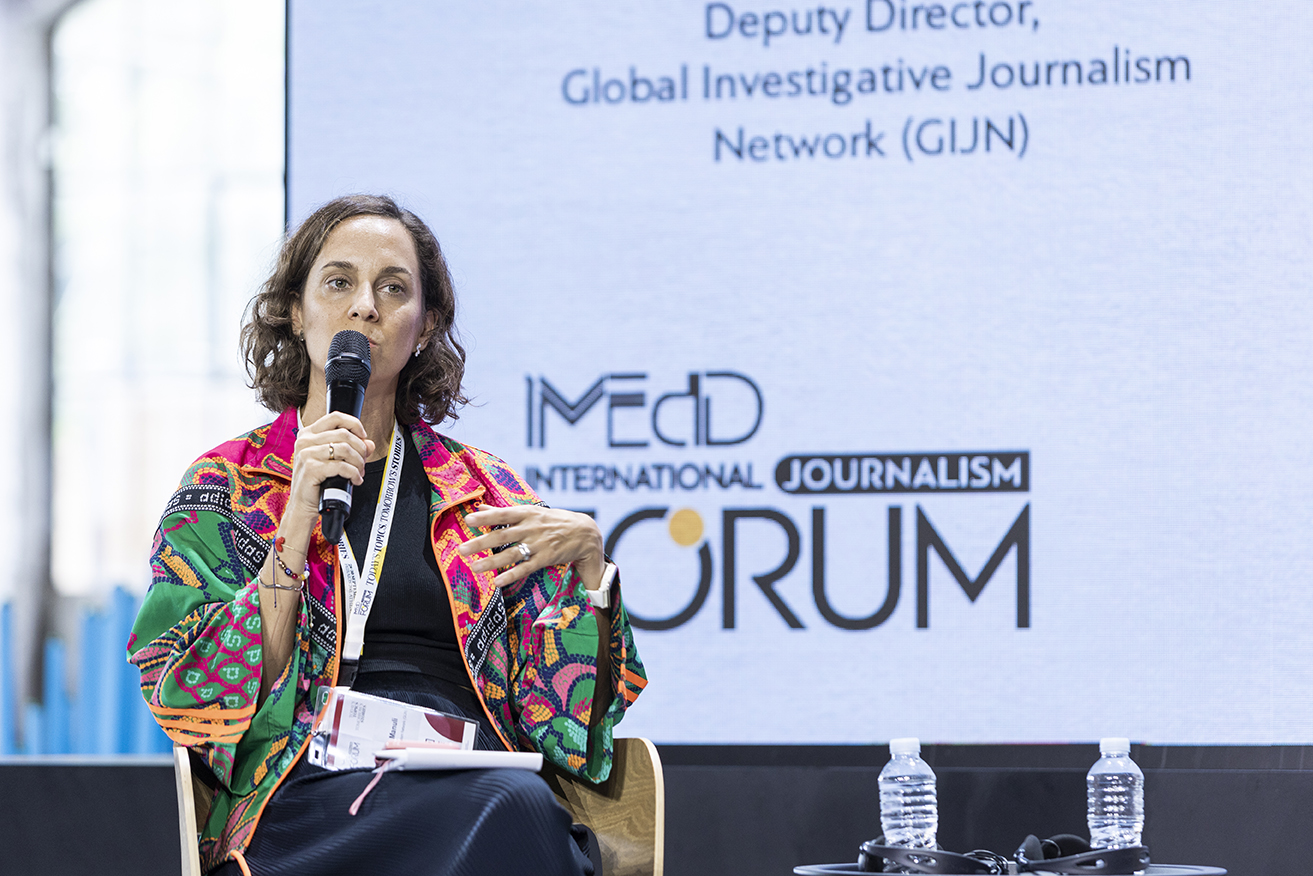
You will be surprised by how many people are willing to help you. Even people with high positions. You should keep trying. And you should find your tribe, your mentors. Try to learn from them.
Gabriela Manuli, Deputy Director at the Global Investigative Journalism Network (GIJN).
Building empathy
For Manisha Ganguly, Investigative Journalist and Academic, “the important thing is building that emotional human connection with the victim and letting them know that you’re on their side fighting the same fight.” This is extremely necessary, since “a lot of these victims feel alienated, isolated and desensitized, while their violence and trauma are repressed and normalized”. However, some journalists still lack the skills to approach the victims. “It’s more a question of imagination and emotional intelligence”, continues Manisha Ganguly. “Most people lack the imagination to find themselves in the other person’s shoes.” This statement resonates with Catherine Gicheru, who adds “this requires us to put ourselves in the shoes of the individuals and wonder ‘How would they like that story to be told by me?’”.
Building self-empathy
Most toolkits for journalists offer tips on how to deal with the emotional toll of the victims. However, what happens with journalists themselves? Who is responsible for their emotional wellbeing in order to be able to deal with trauma and violence, as well as overcome the discrimination they themselves might face?
In the case of Manisha Ganguly, she had to deal with four different factors intersecting at the same time; her young age, her gender, her race, as well as the fact that she is a first-generation immigrant. On top of that, she is engaged in the male-dominated fields of academia, investigative journalism, and the filmmaking industry. Micro-aggressions are not uncommon in these fields leaving journalists wonder “How do you make space for yourself in these spaces? How would you get taken seriously?”. Things get even worse when we are talking about sexual harassment. Manisha Ganguly reports that “every single time you’re sexually harassed, it makes you feel like less of a person because you’re just objectified to the point where you’re just literally your gender. And it takes away all your struggles, all your credibility, every award you’ve ever won. None of it matters because at that moment you are just a walking vagina.”
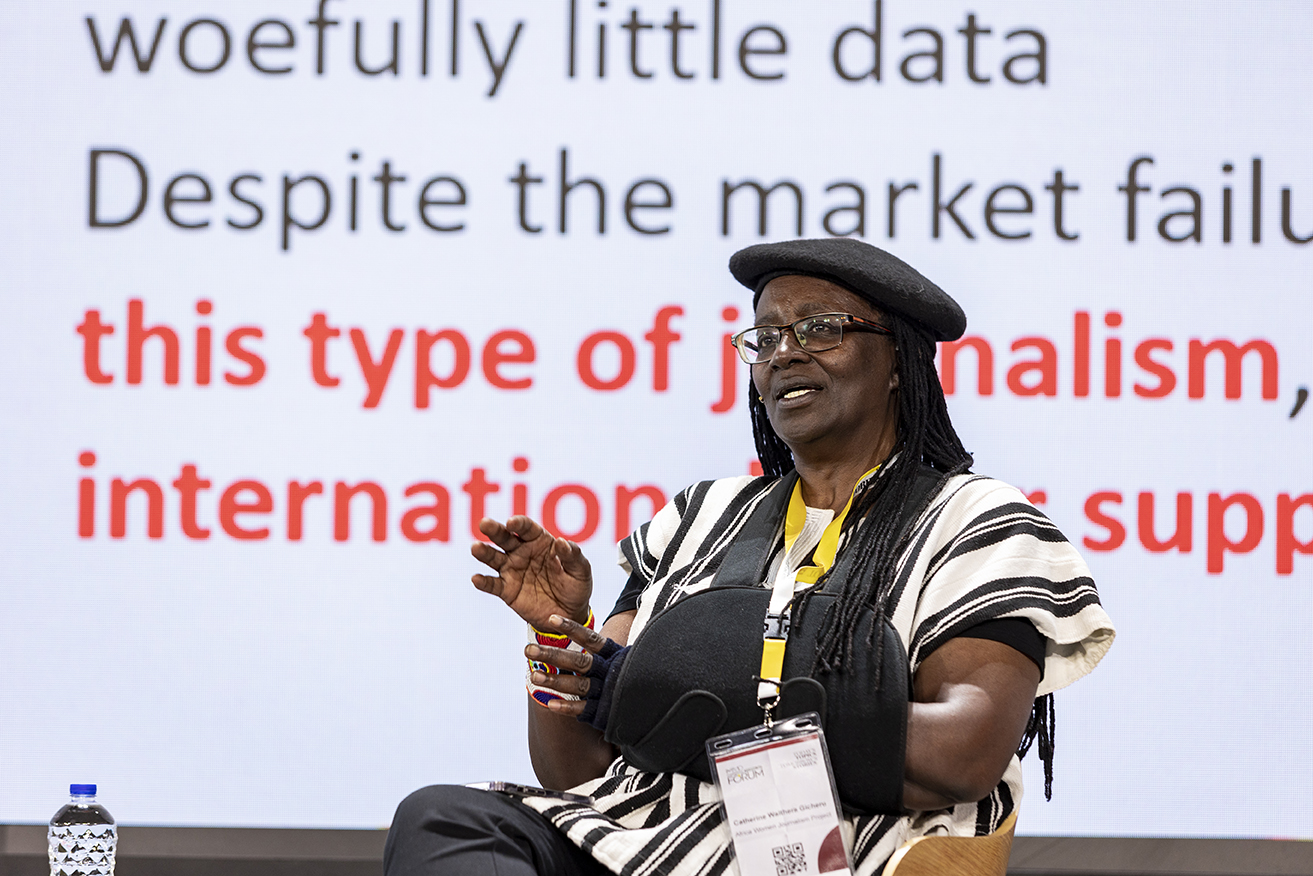
When you move down, pull somebody behind you. You have somebody in front of you. Make sure there’s somebody behind you on this road.
Catherine Gicheru, ICFJ Fellow/Director, Africa Women Journalism Project.
Navigating burnout: A guide for journalists

AX Mina (Ana), Leadership Trainer and Coach at the The Self Investigation offers her insights into burnout in journalism and some tips on how to tackle it in a culture that requires us to be on 24/7.
Dealing with burnout
“Burnout is across all genders, but I think women are especially vulnerable because in most cases we are the ones that suffer more imposter syndrome. We are the ones that have been educated to be always perfect. You don’t release a story if it’s not perfect, you don’t do anything if you don’t feel 100% confidence. And that, of course, leads to more burnout”, confesses Gabriela Manuli. Imposter syndrome is defined as a feeling of “self-doubt of intellect, skills, or accomplishments among high-achieving individuals” by the National Library of Medicine. Studies show that women suffer more from imposter syndrome than their male counterparts due to various reasons. A striking example is that men apply for a job when they meet only 60% of the qualifications, but women apply only if they meet 100% of them, based on the findings of a Hewlett Packard internal report.
As Gabriela Manuli points out, burnout is a structural problem that cannot always be fought with simplistic techniques, such as taking a long vacation or doing some exercise. She thinks that “the only way to change this is with the collective. This is not something that one person would change, as requires all of us to be united and fight and thrive.” At the same spirit, Manisha Ganguly believes in the power of collaborative investigative journalism, since collaboration can lead to better mental health and, therefore, to better investigations.
Manisha Ganguly referred to women’s imposter syndrome too, stressing that “This is an endurance test. It’s a test of resilience. It’s a marathon, not a sprint. And that doesn’t just mean that it’s a long-distance game. It also means that you’re going to hear ‘no’ about 100 times before somebody says ‘yes’, but if you stop at the fifth or the tenth ‘no’, you let them win because it’s not designed to let you win. So, every time you fail, it’s not personal. It’s literally about persisting.”
Catherine Gicheru points out three vital qualities that should be part of every journalist’s work. Persistence, which derives from one’s passionate drive to make a difference in this world. Solidarity, which helps women understand that they are not alone in this fight. Finally, vulnerability, which does not necessarily mean weakness. “When you move down, pull somebody behind you. You have somebody in front of you. Make sure there’s somebody behind you on this road”, she adds.
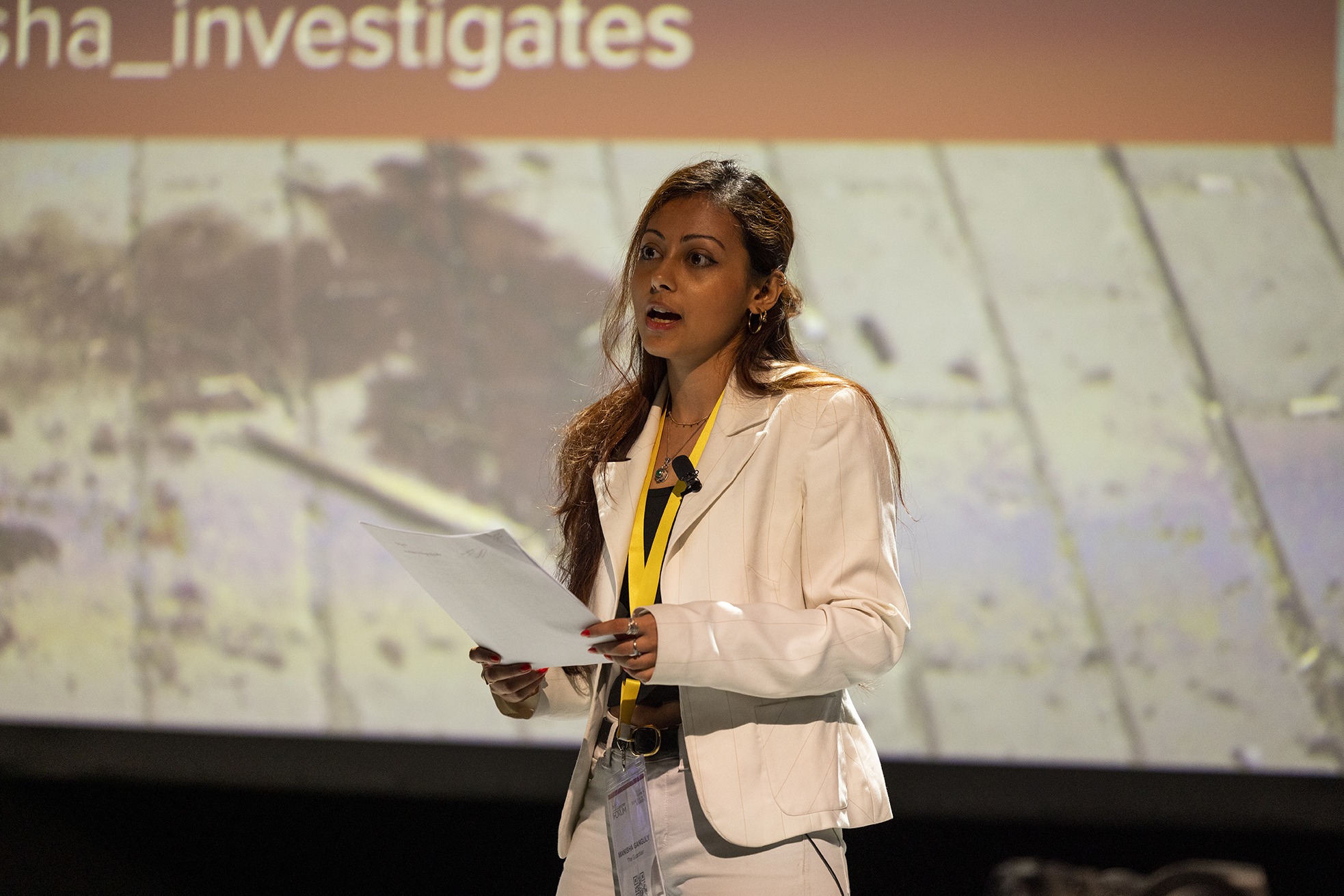
Ask for forgiveness, never permission, because if you wait for someone to give you permission, you’ll be waiting for the rest of your life.
Manisha Ganguly, Investigative Journalist and Academic.
Investigating war crimes using OSINT: A guide for journalists
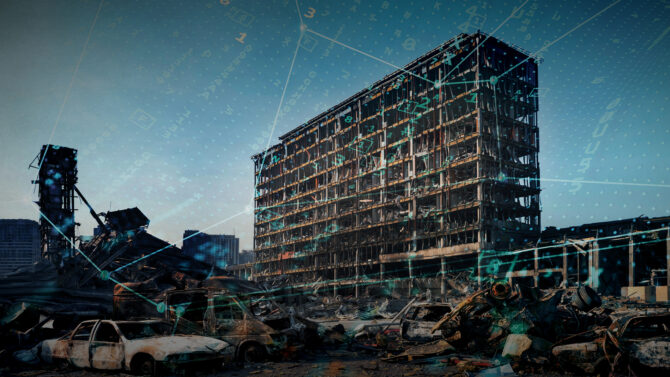
Dr. Manisha Ganguly discussed at the iMEdD International Journalism Forum the techniques journalists can employ to investigate potential war crimes using information readily accessible to the public.
Finding the motivation
Accountability and justice are the key driving forces of Ganguly’s investigations. “I’m not trying to save the world. I’m just trying to hold bad guys to account”, she tells iMEdD. Of course, accountability depends on international law and courts, however, even the identification of criminals by journalists can create an important shift in how they are perceived in public life. On the other hand, justice means visibility for the victims, showing them that their voice really matters, and that there is a platform to host it.
As far as perpetrators are concerned, they usually operate with impunity, since they feel they are above the law. Actually, it is all about power dynamics, as Ganguly points out. “They’re always used to being in control, in power and on top of the hierarchy. Shifting and subverting this dynamic is all about showing them that they are not immune to this, that the power does belong to the people and the victims, and that they can be held accountable, at least in the public eye, if not in the courts of justice.”
The tools she uses to achieve this include open-source investigation (OSINT), which offers transparency and credibility to the source. “You don’t need to trust me or take my word for it. You just have to see it for yourself and then you come up with a decision.”
Paving the way for the next generations
All three journalists stressed how important it is to identify our value and worth and voice it at our workplace. Despite the moves towards this direction, there is a lot to be done in order to ensure that men, women, femininities and non-binary people are equally treated not only at work, but in all fields of private and public life. Besides, it is beyond doubt that once we enter the newsroom or any other workplace, we constantly have to prove ourselves. For Manisha Ganguly, the only way to survive in this contemporary competitive environment is the following: “Ask for forgiveness, never permission, because if you wait for someone to give you permission, you’ll be waiting for the rest of your life.”